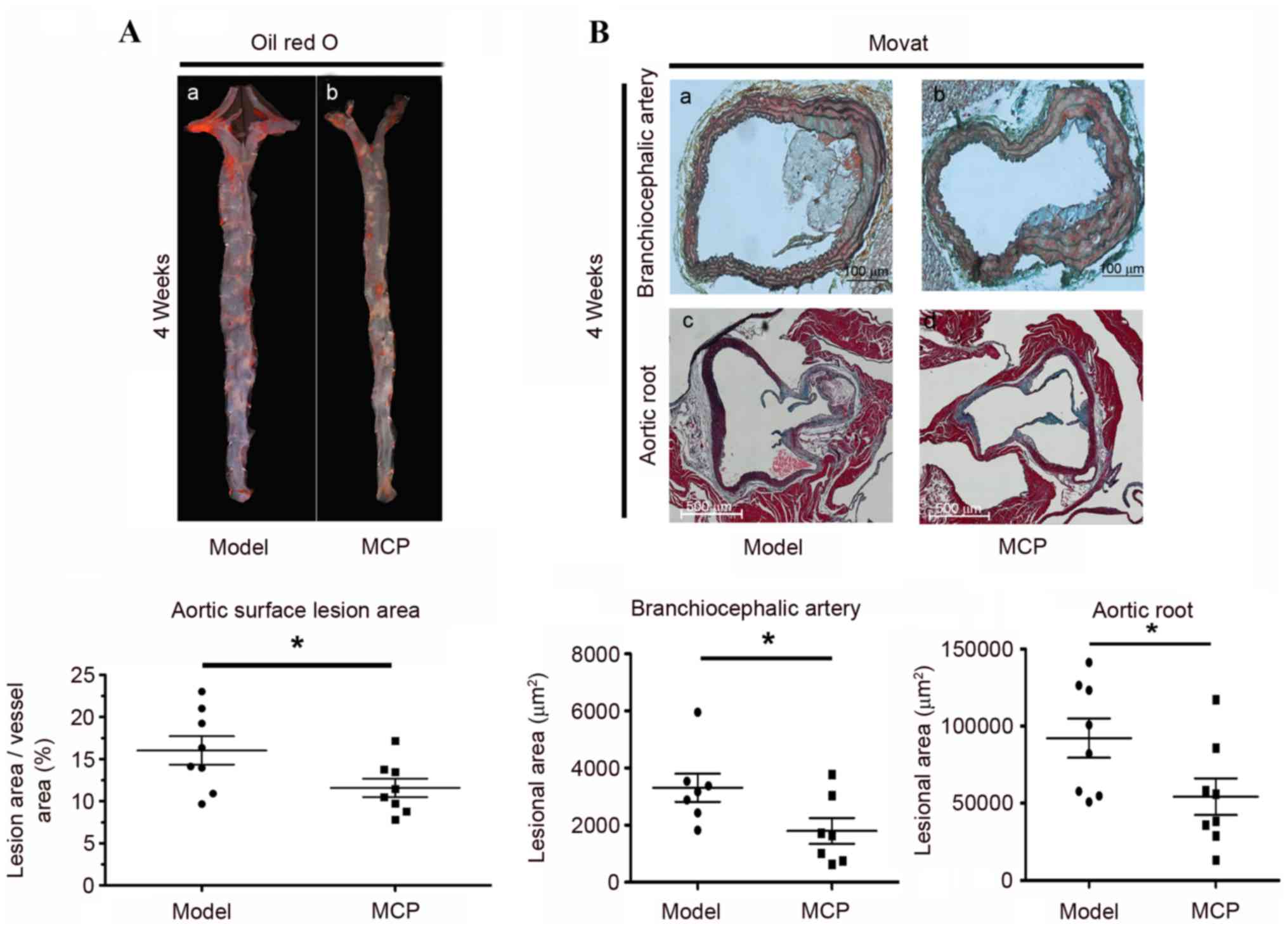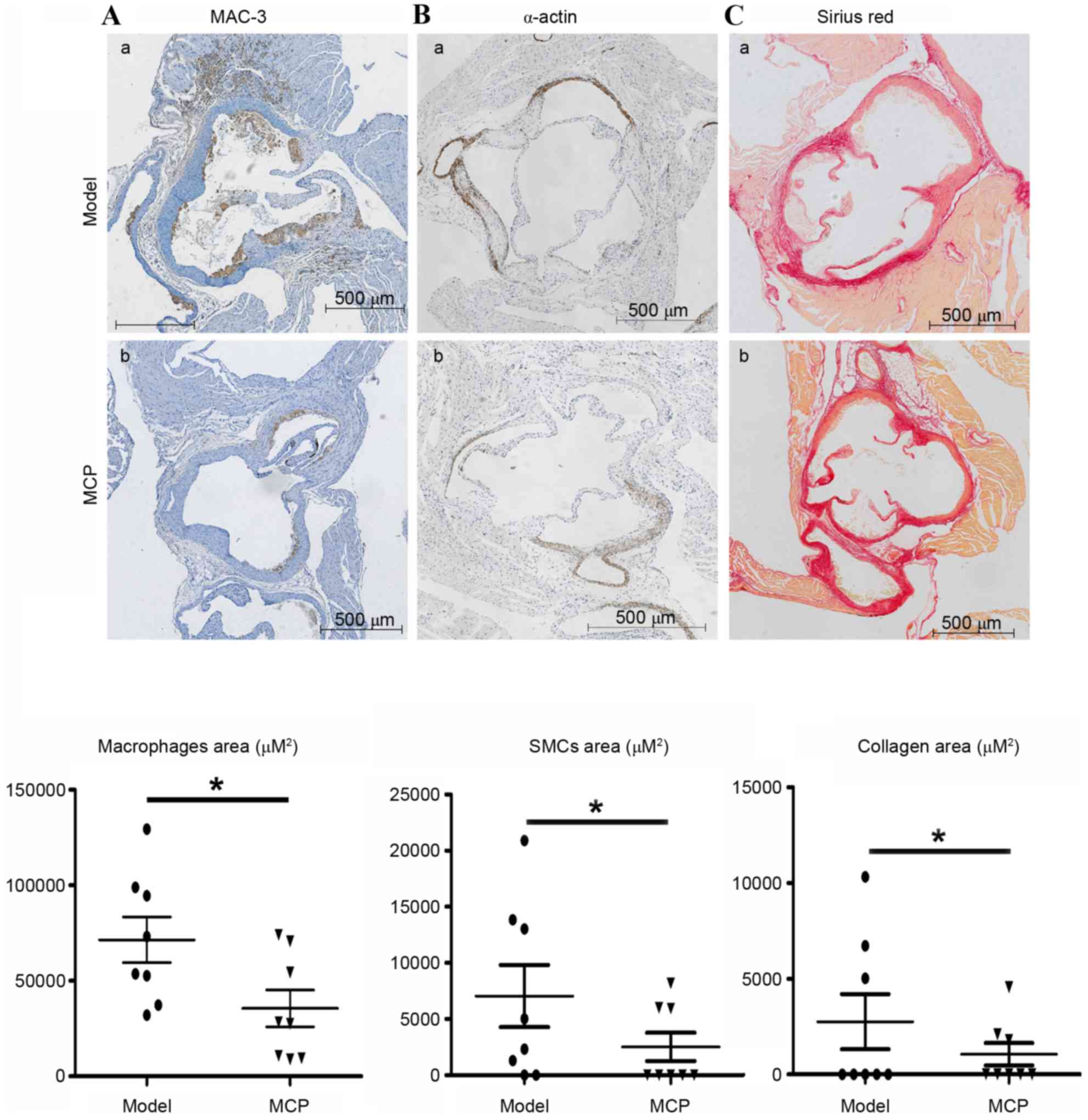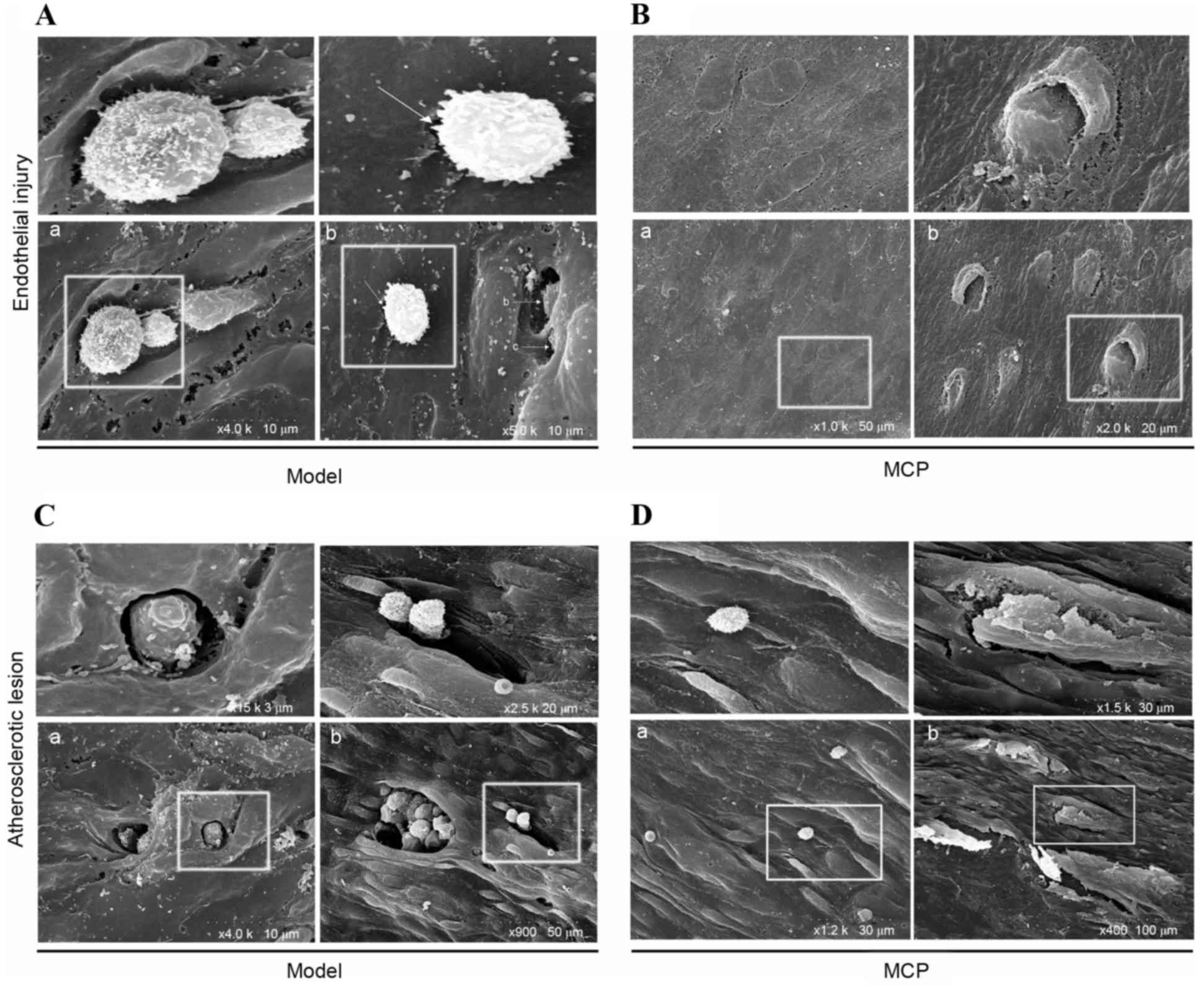|
1
|
Chistiakov DA, Revin VV, Sobenin IA,
Orekhov AN and Bobryshev YV: Vascular endothelium: Functioning in
norm, changes in atherosclerosis and current dietary approaches to
improve endothelial function. Mini Rev Med Chem. 15:338–350. 2015.
View Article : Google Scholar : PubMed/NCBI
|
|
2
|
Schäfer A and Bauersachs J: Endothelial
dysfunction, impaired endogenous platelet inhibition and platelet
activation in diabetes and atherosclerosis. Curr Vasc Pharmacol.
6:52–60. 2008. View Article : Google Scholar : PubMed/NCBI
|
|
3
|
Blankenberg S, Barbaux S and Tiret L:
Adhesion molecules and atherosclerosis. Atherosclerosis.
170:191–203. 2003. View Article : Google Scholar : PubMed/NCBI
|
|
4
|
Rao SP, Wang Z, Zuberi RI, Sikora L,
Bahaie NS, Zuraw BL, Liu FT and Sriramarao P: Galectin-3 functions
as an adhesion molecule to support eosinophil rolling and adhesion
under conditions of flow. J Immunol. 179:7800–7877. 2007.
View Article : Google Scholar : PubMed/NCBI
|
|
5
|
Soehnlein O: Multiple roles for
neutrophils in atherosclerosis. Circ Res. 110:875–888. 2012.
View Article : Google Scholar : PubMed/NCBI
|
|
6
|
Nieminen J, St-Pierre C, Bhaumik P,
Poirier F and Sato S: Role of galectin-3 in leukocyte recruitment
in a murine model of lung infection by Streptococcus pneumoniae. J
Immunol. 180:2466–2473. 2008. View Article : Google Scholar : PubMed/NCBI
|
|
7
|
Tadokoro T, Ikekita M, Toda T, Ito H, Sato
T, Nakatani R, Hamaguchi Y and Furukawa K: Involvement of
Galectin-3 with vascular cell adhesion molecule-1 in growth
regulation of mouse BALB/3T3 cells. J Biol Chem. 284:35556–35563.
2009. View Article : Google Scholar : PubMed/NCBI
|
|
8
|
Inohara H, Akahani S, Koths K and Raz A:
Interactions between galectin-3 and Mac-2-binding protein mediate
cell-cell adhesion. Cancer Res. 56:4530–4534. 1996.PubMed/NCBI
|
|
9
|
Sasaki T, Brakebusch C, Engel J and Timpl
R: Mac-2 binding protein is a cell-adhesive protein of the
extracellular matrix which self-assembles into ring-like structures
and binds beta1 integrins, collagens and fibronectin. EMBO J.
17:1606–1613. 1998. View Article : Google Scholar : PubMed/NCBI
|
|
10
|
Sano H, Hsu DK, Yu L, Apgar JR, Kuwabara
I, Yamanaka T, Hirashima M and Liu FT: Human galectin-3 is a novel
chemoattractant for monocytes and macrophages. J Immunol.
165:2156–2164. 2000. View Article : Google Scholar : PubMed/NCBI
|
|
11
|
Hopkins PN: Molecular biology of
atherosclerosis. Physiol Rev. 93:1317–1542. 2013. View Article : Google Scholar : PubMed/NCBI
|
|
12
|
Tekabe Y, Li Q, Rosario R, Sedlar M,
Majewski S, Hudson BI, Einstein AJ, Schmidt AM and Johnson LL:
Development of receptor for advanced glycation end
products-directed imaging of atherosclerotic plaque in a murine
model of spontaneous atherosclerosis. Circ Cardiovasc Imaging.
1:212–219. 2008. View Article : Google Scholar : PubMed/NCBI
|
|
13
|
Gao X, Zhi Y, Zhang T, Xue H, Wang X,
Foday AD, Tai G and Zhou Y: Analysis of the neutral polysaccharide
fraction of MCP and its inhibitory activity on galectin-3.
Glycoconj J. 29:159–165. 2012. View Article : Google Scholar : PubMed/NCBI
|
|
14
|
Nachtigal M, Ghaffar A and Mayer EP:
Galectin-3 gene inactivation reduces atherosclerotic lesions and
adventitial inflammation in ApoE-deficient mice. Am J Pathol.
172:247–255. 2008. View Article : Google Scholar : PubMed/NCBI
|
|
15
|
Jacob SS, Shastry P and Sudhakaran PR:
Monocyte-macrophage differentiation in vitro: Modulation by
extracellular matrix protein substratum. Mol Cell Biochem.
233:9–17. 2002. View Article : Google Scholar : PubMed/NCBI
|
|
16
|
MacKinnon AC, Farnworth SL, Hodkinson PS,
Henderson NC, Atkinson KM, Leffler H, Nilsson UJ, Haslett C, Forbes
SJ and Sethi T: Regulation of alternative macrophage activation by
galectin-3. J Immunol. 180:2650–2658. 2008. View Article : Google Scholar : PubMed/NCBI
|
|
17
|
Walski M, Chlopicki S, Celary-Walska R and
Frontczak-Baniewicz M: Ultrastructural alterations of endothelium
covering advanced atherosclerotic plaque in human carotid artery
visualized by scanning electron microscope. J Physiol Pharmacol.
53:713–723. 2002.PubMed/NCBI
|
|
18
|
Nathan L, Pervin S, Singh R, Rosenfeld M
and Chaudhuri G: Estradiol inhibits leukocyte adhesion and
transendothelial migration in rabbits in vivo: Possible mechanisms
for gender differences in atherosclerosis. Circ Res. 85:377–385.
1999. View Article : Google Scholar : PubMed/NCBI
|
|
19
|
MacKinnon AC, Liu X, Hadoke PW, Miller MR,
Newby DE and Sethi T: Inhibition of galectin-3 reduces
atherosclerosis in apolipoprotein E-deficient mice. Glycobiology.
23:654–663. 2013. View Article : Google Scholar : PubMed/NCBI
|
|
20
|
Swarte VV, Mebius RE, Joziasse DH, Van den
Eijnden DH and Kraal G: Lymphocyte triggering via L-selectin leads
to enhanced galectin-3-mediated binding to dendritic cells. Eur J
Immunol. 28:2864–2871. 1998. View Article : Google Scholar : PubMed/NCBI
|
|
21
|
Funasaka T, Raz A and Nangia-Makker P:
Galectin-3 in angiogenesis and metastasis. Glycobiology.
24:886–891. 2014. View Article : Google Scholar : PubMed/NCBI
|
|
22
|
Hynes RO: The extracellular matrix: Not
just pretty fibrils. Science. 326:1216–1219. 2009. View Article : Google Scholar : PubMed/NCBI
|
|
23
|
Hashiba K, Sano M, Nio-Kobayashi J, Hojo
T, Skarzynski DJ and Okuda K: Galectin-3 contributes to luteolysis
by binding to Beta 1 integrin in the bovine corpus luteum. Biol
Reprod. 91:22014. View Article : Google Scholar : PubMed/NCBI
|
|
24
|
Hatley ME, Srinivasan S, Reilly KB, Bolick
DT and Hedrick CC: Increased production of 12/15 lipoxygenase
eicosanoids accelerates monocyte/endothelial interactions in
diabetic db/db mice. J Biol Chem. 278:25369–25375. 2003. View Article : Google Scholar : PubMed/NCBI
|
|
25
|
Cybulsky MI, Iiyama K, Li H, Zhu S, Chen
M, Iiyama M, Davis V, Gutierrez-Ramos JC, Connelly PW and Milstone
DS: A major role for VCAM-1, but not ICAM-1, in early
atherosclerosis. J Clin Invest. 107:1255–1262. 2001. View Article : Google Scholar : PubMed/NCBI
|
|
26
|
Ingber DE: Cellular tensegrity: Defining
new rules of biological design that govern the cytoskeleton. J Cell
Sci. 104:613–627. 1993.PubMed/NCBI
|


















